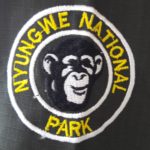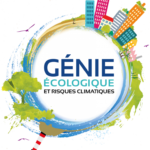Our past activities
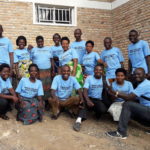 June 2017 – In Rwanda, Resilience Now conducted a Solutions Worth Sharing workshop with Kopainya, a cooperative of vegetable growers, in the framework of its project “Civil Society Engagement in and around Cyamudongo Forest and Nyungwe National Park” to introduce within communities new practices lowering the impact on the environment in the field of agriculture and energy, on a CEPF large grant.
June 2017 – In Rwanda, Resilience Now conducted a Solutions Worth Sharing workshop with Kopainya, a cooperative of vegetable growers, in the framework of its project “Civil Society Engagement in and around Cyamudongo Forest and Nyungwe National Park” to introduce within communities new practices lowering the impact on the environment in the field of agriculture and energy, on a CEPF large grant.
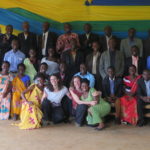 March 2017 – In Rwanda, Resilience Now conducted a Solutions Worth Sharing workshop with Zirarese cooperative, a cooperative of cattle breeders and milk producers, in the framework of its project “Civil Society Engagement in and around Cyamudongo Forest and Nyungwe National Park” to introduce within communities new practices lowering the impact on the environment in the field of agriculture and energy, on a CEPF large grant.
March 2017 – In Rwanda, Resilience Now conducted a Solutions Worth Sharing workshop with Zirarese cooperative, a cooperative of cattle breeders and milk producers, in the framework of its project “Civil Society Engagement in and around Cyamudongo Forest and Nyungwe National Park” to introduce within communities new practices lowering the impact on the environment in the field of agriculture and energy, on a CEPF large grant.
Dec. 2016 – In Burundi, Resilience Now conducted the final evaluation of the project “Socio-economic integration of young people with disabilities in the province of Gitega” for Handicap International.
Sept 2016 – In Burkina Faso, Resilience Now participated in the definition of an observatory of the social and environmental impacts of gold mining, in the framework of an impact study of industrial and artisanal gold mining in the Bam Area conducted by BURGEAP.
Aug.? 2016 – In Rwanda, Resilience Now XXX
Dec. 2015 – March 2016 – In Haiti, Resilience Now developed a Households Economic Resilience Analysis Framework for Handicap International so that this organization can include the resilience approach in its development projects.
Sept. 2015 – In France, Resilience Now advised the In-Situ agency for the design of a permaculture farm in the framework of a bid for the Bruyères hippodrome rehabilitation in Rouen into an urban park.
Sept. 2015 – In France, Resilience Now lectured by call on “How to use the psychology of change to introduce sustainable behaviors” for the IUCN-PPI-PACO, in the framework of a learning event for their grantees in Cameroon.
July 2015 – In Kenya, Resilience Now lectured on “How to use the psychology of change to introduce sustainable behaviors” at the request of Birdlife International in the framework of a CEPF learning event in Nairobi for their grantees working in Eastern Afromontane Biodiversity Hotspots.
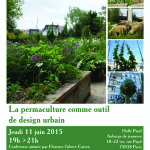 June 2015 – In France, Resilience Now conducted a workshop about “Permaculture for Urban Planning” as part of a workshop series organized by the Ile de France Agency for Nature and Biodiversity (NatureParif). The workshop introduced participants to the principles of an efficient and resilient system, their application to urban settings, and various techniques for food and energy production and waste management
June 2015 – In France, Resilience Now conducted a workshop about “Permaculture for Urban Planning” as part of a workshop series organized by the Ile de France Agency for Nature and Biodiversity (NatureParif). The workshop introduced participants to the principles of an efficient and resilient system, their application to urban settings, and various techniques for food and energy production and waste management
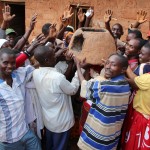 April 2015 – On the web, Resilience Now won the 2015 Photo Contest organised by the Critical Ecosystem Partnership Fund (CEPF) in the “Climate Change” category. The winning picture features the participants of a workshop in Burundi to build community resilience unanimously acclaim the improved cook stove, a solution that dramatically reduce deforestation as well women chores.
April 2015 – On the web, Resilience Now won the 2015 Photo Contest organised by the Critical Ecosystem Partnership Fund (CEPF) in the “Climate Change” category. The winning picture features the participants of a workshop in Burundi to build community resilience unanimously acclaim the improved cook stove, a solution that dramatically reduce deforestation as well women chores.
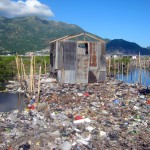 Dec. 2014 – Jan. 2015 – In Haiti, Resilience Now conducted on behalf of BURGEAP a social impact assessment for a solid waste management center in the Cap Haitien area, a project funded by the Inter-American Development Bank (IDB) and the French cooperation agency (AFD). The study aimed to identify the impact of the project on local residents and on part of the informal sector which removes and recycles waste.
Dec. 2014 – Jan. 2015 – In Haiti, Resilience Now conducted on behalf of BURGEAP a social impact assessment for a solid waste management center in the Cap Haitien area, a project funded by the Inter-American Development Bank (IDB) and the French cooperation agency (AFD). The study aimed to identify the impact of the project on local residents and on part of the informal sector which removes and recycles waste.
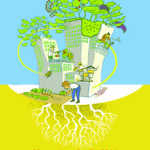 June 2014 – In France, Resilience Now lectured about “Permaculture for Urban Planning” during the Urban Farming Summer Workshops organized by the Ile de France Agency for Nature and Biodiversity (NatureParif). The lecture presented the principles of an efficient and resilient system and discussed their application to urban settings.
June 2014 – In France, Resilience Now lectured about “Permaculture for Urban Planning” during the Urban Farming Summer Workshops organized by the Ile de France Agency for Nature and Biodiversity (NatureParif). The lecture presented the principles of an efficient and resilient system and discussed their application to urban settings.
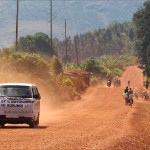 May 2014 – In Burundi, Resilience Now conducted a “Solutions worth Sharing” project near the Kibira National Park, with funds and operational support from the Critical Ecosystem Partnership Fund (CEPF) and Birdlife International. This project supported vulnerable communities to improve their resilience through the sharing of locally developed solutions addressing critical environmental challenges.
May 2014 – In Burundi, Resilience Now conducted a “Solutions worth Sharing” project near the Kibira National Park, with funds and operational support from the Critical Ecosystem Partnership Fund (CEPF) and Birdlife International. This project supported vulnerable communities to improve their resilience through the sharing of locally developed solutions addressing critical environmental challenges.
April 2014 – In the United States, Resilience Now gave a presentation on the levers of behavioral change to members of the Commission on Education and Communication of the International Union for Conservation of Nature (IUCN) during a meeting hosted by the Pew Charitable Trusts.
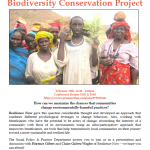 Feb. 2014 – In the United States, Resilience Now gave a presentation on the levers of behavioral change at the headquarters of Conservation International.
Feb. 2014 – In the United States, Resilience Now gave a presentation on the levers of behavioral change at the headquarters of Conservation International.
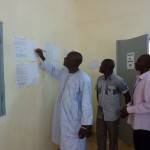 Oct. 2013 – In Mali, Resilience Now wrote a project proposal to improve the climate resilience of people living in the North of the country (Timbuktu region) on behalf of a consortium of NGOs (Handicap International, AVSF, Plan-International) as part of the BRACED program (Building resilience and adaptation to climate extremes and disasters) of the UK’s Department for International Development (DFID).
Oct. 2013 – In Mali, Resilience Now wrote a project proposal to improve the climate resilience of people living in the North of the country (Timbuktu region) on behalf of a consortium of NGOs (Handicap International, AVSF, Plan-International) as part of the BRACED program (Building resilience and adaptation to climate extremes and disasters) of the UK’s Department for International Development (DFID).
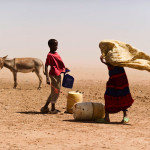 July-December 2013 – In the Horn of Africa, Resilience Now was commissioned by CARE International to evaluate their drought management and resilience building activities in Ethiopia, Somalia and Kenya and to develop an integrated drought cycle management framework for their programmes across the region. .
July-December 2013 – In the Horn of Africa, Resilience Now was commissioned by CARE International to evaluate their drought management and resilience building activities in Ethiopia, Somalia and Kenya and to develop an integrated drought cycle management framework for their programmes across the region. .
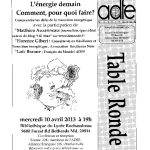 April 2013 – In the United States, Resilience Now presented a lecture about energy issues and the need to implement plans for fossil fuel transition to the association of expatriates French of the World (ADFE). The lecture argued that climate change and peak oil are challenges which should be addressed through a strategic and chosen decarbonisation of the economy.
April 2013 – In the United States, Resilience Now presented a lecture about energy issues and the need to implement plans for fossil fuel transition to the association of expatriates French of the World (ADFE). The lecture argued that climate change and peak oil are challenges which should be addressed through a strategic and chosen decarbonisation of the economy.
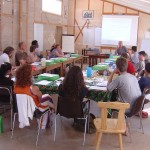 Oct. 2012 – In France, Resilience Now participated in the Groupe URD Autumn School on Humanitarian Aid, themed: “Resilience: buzz word or useful concept?” Resilience is a concept used in the fields of climate change, natural disasters and poverty. How to have an integrated approach of these fields? The question was discussed for two days.
Oct. 2012 – In France, Resilience Now participated in the Groupe URD Autumn School on Humanitarian Aid, themed: “Resilience: buzz word or useful concept?” Resilience is a concept used in the fields of climate change, natural disasters and poverty. How to have an integrated approach of these fields? The question was discussed for two days.
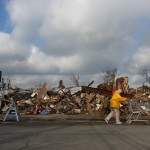 2012-2014 – In the United States, Resilience Now participated in the US Resilience System, an initiative to assess the strengths and weaknesses in the resilience of US cities (New York, Washington DC, Detroit). Resilience Now was in charge of writing the evaluation questionnaire that was used by resilience observers deployed in these cities.
2012-2014 – In the United States, Resilience Now participated in the US Resilience System, an initiative to assess the strengths and weaknesses in the resilience of US cities (New York, Washington DC, Detroit). Resilience Now was in charge of writing the evaluation questionnaire that was used by resilience observers deployed in these cities.
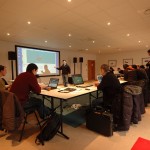 Feb. 2012 – In France, Resilience Now conducted workshops about resilience for programme directors of humanitarian NGOs French Red Cross, Action against Hunger and Handicap International. Topics included the types of risks, components of resilience and the methodology for its improvement. Ways to integrate resilience in the project cycle (aka in the objectives, activities and indicators) were presented.
Feb. 2012 – In France, Resilience Now conducted workshops about resilience for programme directors of humanitarian NGOs French Red Cross, Action against Hunger and Handicap International. Topics included the types of risks, components of resilience and the methodology for its improvement. Ways to integrate resilience in the project cycle (aka in the objectives, activities and indicators) were presented.
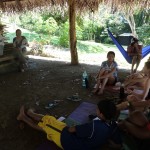 Jan. 2012 – In Costa Rica, Resilience Now presented the concept of resilience to students from different countries gathered at the Research Center of Natural and Social Resources (CIRENAS). The topics included the types of risks, the components of resilience and the methodology for its improvement. Examples were taken from the fields of disaster risk reduction and food security.
Jan. 2012 – In Costa Rica, Resilience Now presented the concept of resilience to students from different countries gathered at the Research Center of Natural and Social Resources (CIRENAS). The topics included the types of risks, the components of resilience and the methodology for its improvement. Examples were taken from the fields of disaster risk reduction and food security.
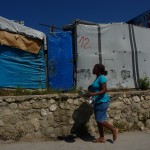 Nov. 2011 – In Haiti, Resilience Now participated in the “Race to Resilience” (R2R), a campaign aiming at improving the health and resilience of Haitian communities through better sanitation. Resilience Now assessed resilience gaps in the field of water and sanitation and proposed ecological and locally adapted sanitation solutions for the communities of Cité-Soleil, Cayes-Jacmel and Aquin.
Nov. 2011 – In Haiti, Resilience Now participated in the “Race to Resilience” (R2R), a campaign aiming at improving the health and resilience of Haitian communities through better sanitation. Resilience Now assessed resilience gaps in the field of water and sanitation and proposed ecological and locally adapted sanitation solutions for the communities of Cité-Soleil, Cayes-Jacmel and Aquin.
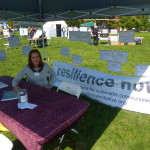 Oct. 2011 – In Washington DC, Resilience Now participated in STAR-TIDES, an event aiming at presenting the policies, practices, technologies and organizations involved in complex crisis environments. Resilience Now promoted the concepts of resilience and permaculture.
Oct. 2011 – In Washington DC, Resilience Now participated in STAR-TIDES, an event aiming at presenting the policies, practices, technologies and organizations involved in complex crisis environments. Resilience Now promoted the concepts of resilience and permaculture.
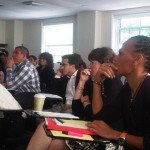 June 2011 – In Boston, MA (USA), Resilience Now participated in the World Conference on Humanitarian Studies (WCHS). Resilience Now gave a lecture on how humanitarian organizations can benefit from the methods and techniques gathered by permaculture and how the latter helps strengthen community resilience.
June 2011 – In Boston, MA (USA), Resilience Now participated in the World Conference on Humanitarian Studies (WCHS). Resilience Now gave a lecture on how humanitarian organizations can benefit from the methods and techniques gathered by permaculture and how the latter helps strengthen community resilience.
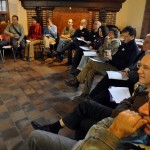 Jan. 2011 – In France, Resilience Now organized two seminars gathering the leaders of transitions initiatives in France. During the two days of each seminar (one for the North and one for the South of the country), many workshops allowed participants to meet, get acquainted with the Transition Town methods and get ideas of projects for their localities.
Jan. 2011 – In France, Resilience Now organized two seminars gathering the leaders of transitions initiatives in France. During the two days of each seminar (one for the North and one for the South of the country), many workshops allowed participants to meet, get acquainted with the Transition Town methods and get ideas of projects for their localities.
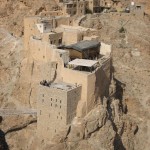 Nov. 2008 – In Syria, Resilience Now mapped the needs and proposed operating cycles for energy, water and waste management for the monastery of Deir Mar Musa, an isolated community, located near a protected natural area.
Nov. 2008 – In Syria, Resilience Now mapped the needs and proposed operating cycles for energy, water and waste management for the monastery of Deir Mar Musa, an isolated community, located near a protected natural area.


